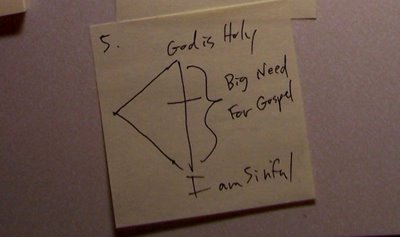James 4:11-12
-----Do not speak evil against one another, brothers. The one who speaks against a brother or judges his brother, speaks evil against the law and judges the law. But if you judge the law, you are not a doer of the law but a judge. [12] There is only one lawgiver and judge, he who is able to save and to destroy. But who are you to judge your neighbor?
(Note: When we say “judge” neither James nor I mean simply discerning between right and wrong, but we mean a condemning or despising on the basis of discerning someone's life or action as wrong. Indeed James could not write his letter if he intended the former meaning.)
Which Law?-----In today's passage is a very hard-to-understand statement: “The one who speaks evil against his brother or judges his brother, speaks evil against the law and judges the law.” It is critical that this be understood because James' goes on in the passage to correct his audience for judging the law, a charge that would have seemed outrageous to them. Much like the Pharisees in Jesus' time they would have claimed to have loved God's law, a very righteous sentiment (Psalm 119:13). Therefore it is necessary to defend that they actually judge the law.
-----James says that we can judge our brothers in a way that is in some sense judging the law. When we see the word “law” we naturally define it as God's perfect standard. When we see the word “judge” we naturally think of evaluating something by a higher standard. So, based on these definitions, in judging the law we would supersede or contradict the law. However, when we judge our brother we do not of necessity need to do either one of these (although this does happens, like in the case of the Pharisees). To judge our brother all we need is to apply the law—God's perfect standard—and we will find plenty to slander our brother with.
-----Again I ask, how do we judge our brother in such a way that we judge the law by necessity? Perhaps James doesn't mean law in the sense of God's perfect moral standard. If we search Jame's letter we will find that indeed another sense of law exists in his mind. He says in 2:12, “So speak and so act as those who are to be judged under the law of liberty.” This law of liberty is a merciful law. If we use this definition it becomes perfectly clear what James means: “When you judge your brother without mercy you are saying that the law of liberty is unrighteous in how it forgives and forbears with the sins of those who trust in Jesus.”
Do the Law.-----James goes on to say, “But if you judge the law, you are not a doer of the law but a judge.” This verse becomes clear as we understand that James is talking about the law of liberty. In 2:12,13 James wrote, “So speak and so act as those who are to be judged under the law of liberty. For judgment is without mercy to one who has shown no mercy.” Not only is the law of liberty merciful, but it also demands mercy from us. So in order to do the law of liberty we must be merciful as it is merciful (see the Parable of the unforgiving slave in Matthew 18). So when we become judges of the law of mercy and supersede it we do not do the law.
-----James goes on to show to an even greater degree the offensiveness of judging our brother as he places judging and lawgiving exclusively in the realm of God* by virtue of His ability to forgive and punish sins. Christ decides who He will be merciful to and who He will not. May no man, contradict His authority. If Christ has shown mercy to our brothers and sisters, which he has, then let us follow suit.
ReviewDo not speak evil against one another [as when you see wrong in your brother's life and thus use it to slander him], brothers. The one who speaks against a brother or judges his brother , speaks evil against the law [of liberty] and judges [the kindness of] the law [of liberty as wicked in forgiving your brother]. But if you judge the law [and say it is too lenient], you are not a doer of the law [ by being merciful] but [you are] a judge [and thus unmerciful and a law-breaker]. There is only one lawgiver and judge, he who is able to save and to destroy. But who are you to judge your neighbor [can you forgive and punish sins]? [Do you dare contradict the One who can?]
*In his commentary on this passage Calvin makes a necessary qualification, “And let us remember that the subject here is not civil government, in which the edicts and laws of magistrates have place, but the spiritual government of the soul, in which the word of God alone ought to bear rule.”
 1. We first realize our need for the gospel when we become aware of God's holiness, and our sinfulness. As you can see there is a gap between God and man.
1. We first realize our need for the gospel when we become aware of God's holiness, and our sinfulness. As you can see there is a gap between God and man. 2. We trust that Christ has taken the punishment we deserve for violating God's holiness. The gospel of Christ bridges the gap between us and God.
2. We trust that Christ has taken the punishment we deserve for violating God's holiness. The gospel of Christ bridges the gap between us and God. 3. As we grow in our relationship with the Lord we become progressively more aware of how great our sin is and how Holy God is. The gap grows in our understanding.
3. As we grow in our relationship with the Lord we become progressively more aware of how great our sin is and how Holy God is. The gap grows in our understanding. 4. Now that the gap is bigger. Therefore, we add our good works to what Christ has done. When we do this, however, we are not relying on Christ alone, and thus we violate the gospel.
4. Now that the gap is bigger. Therefore, we add our good works to what Christ has done. When we do this, however, we are not relying on Christ alone, and thus we violate the gospel. 5. Therefore, as we realize more and more how great our sin is and how holy God is. The gospel must become greater to fill the gap. In this way the work of Christ becomes magnified in the our lives.
5. Therefore, as we realize more and more how great our sin is and how holy God is. The gospel must become greater to fill the gap. In this way the work of Christ becomes magnified in the our lives.
